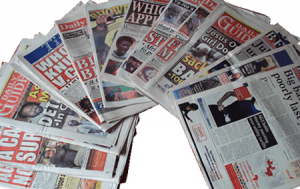Is the media an oxymoron for governance? (Part 2)
 Accountability drifts from the notion of good governance, which is premised on the expectation that office holders will demonstrate behaviours and attitudes that are in conformity with the principles of transparency, efficiency, and integrity. Because accountability is in one breath related to the justification of decisions and actions, public officials are expected to make readily available public information when so demanded by the citizenry.
Accountability drifts from the notion of good governance, which is premised on the expectation that office holders will demonstrate behaviours and attitudes that are in conformity with the principles of transparency, efficiency, and integrity. Because accountability is in one breath related to the justification of decisions and actions, public officials are expected to make readily available public information when so demanded by the citizenry.
However, the cost of such supervision for citizens, vis-à-vis their socioeconomic concerns has resulted in the delegation of such responsibility to public-related entities as the media and other civil society organisations. Hence the educational and information function of the media, to ensure that citizens have the necessary understanding of the political system, as well as their roles and rights in it, to enable them make the necessary demands on government, resulting in the “participant citizenship” which Diamond saw as “keeping informed” about public affairs (Diamond, 1994).
On the contrary, the inherent contradiction in the relationship between the ascribed function of the media as agents of social discourse and their economic status as “purveyors of commoditized knowledge” (Raboy and Dagenais ed., 1992) puts the media in a skittish intermediary role. The media according to Raboy and Dagenais commodify news by paying more attention to fabricated crisis than to one that can stake a material claim to reality (Raboy and Dagenais ed., 1992: 4). As the perceived agents of the crisis strive for control over the media to skew public discourse in favour of their positions, the media turn to gain a claim to social status by manipulating access to the public sphere.
This process establishes a relationship of convenience between the political leadership and the mass media reducing public life to a spectacle. Hence Gedzekpo asserted that instead of capturing what is, a poster rendition of news constructs a codified definition of what should count by re-presentation rather than representation of a social reality.
The media in this context, according to Hasty, does not represent a market place of ideas but instead an institution of propaganda representing the semblance of national unity and cooperation in the pursuit of a common destiny (Hasty, 2005: 10). By the manufacture of consent through propaganda, the media mobilises support for the special interests that dominate the state and private activity stressing their choices, emphasis and omissions as they seek to manage public opinion, deciding what the general populace is allowed to see, hear and ultimately think about (Chomsky and Herman, 1988).
Exposing the public to such persuasive messages, the public is denied meaningful communication through the media in response, as the media are adapted to the systemic demands of the political community under the influence of the political elites. Chomsky (1988) then concluded that, far from performing a watchdog role, the free press serves the needs of those in power and reducing citizens to the status of consumers, and political observers but not as participants. Thus, modern communication techniques are seen not simply as a medium of thought and argument but also a potential source for power, domination and oppression (Frazer, 1992 in Crossley and Roberts, 2004).
In Africa the post-independent media are seen as tools for the mobilization of the people for nation-building efforts as its core responsibility. Media scholars on Africa therefore argued that the primary role of the media is to inform citizens about public policy so they become a more informed electorate (Sandbrook, 1996). The multi-ethnic composition of African states however places more responsibility on the media in Africa as it shoulders the social responsibility of promoting national unity for development.
Devoid of a medium for monitoring and evaluating government’s performance within the public sphere, the routine electoral process will only become symbolic as citizens are short-changed by rhetoric and the communicative proliferation of public officials. The media institution is therefore indispensible in the creation of an open interface between Government and the people by cushioning the shocks of disagreement and alteration.
While specific attitudinal constellations are still suffering from democratic challenges and many contradictory subcultural orientations such as multiple ethnic loyalties, the general acceptance of democracy and the accompanying development of an underlying uniform pattern of political orientations through the instrumentality of the media, particularly the radio, will in the long-run lead to the gradual consolidation of a pattern of political culture that recognizes dialogue, giving the citizens impetus to engage in social, political, and economic debates formally and informally without resorting to undemocratic mechanisms that only distort the democratic process.
In this way citizens are nurtured into public-spirited dialogue and help them to share in certain attitudes, and values that are consistent with democracy. Consequently, their frustrations are voiced out, with the hope that the concerns made public will inform policy decisions. This way even when confronted with major political and economic crises future political change shall be sorted within the parameters of democratic procedures (Linz and Stepan, 1996).
By Kwaku Yeboah
Email: [email protected]
